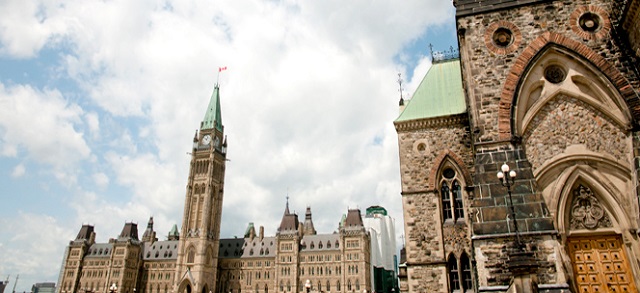Business
Number of federal executives up 42% under Trudeau

From the Canadian Taxpayers Federation
By Ryan Thorpe
“The government has ballooned the bureaucracy across the board, but even more concerning is that this government is swelling the ranks of its most expensive bureaucrats”
Both the number and cost of federal executives has exploded under the watch of Prime Minister Justin Trudeau, according to government data and access-to-information records obtained by the Canadian Taxpayers Federation.
As of 2024, there are 9,155 federal bureaucrats classified as executives by the Trudeau government, an increase of 42 per cent since 2016, when the total sat at 6,414.
“The government has ballooned the bureaucracy across the board, but even more concerning is that this government is swelling the ranks of its most expensive bureaucrats,” said Franco Terrazzano, CTF Federal Director. “Trudeau should go after the fat cats first and that means cutting back the size and cost of the federal c-suite.”
Growth has been seen among every class of executives within the federal government, with salaries ranging from $134,827 to $255,607.
In 2022, the last year for which records are available, federal executives raked in $1.95 billion in total compensation. That represented a 41 per cent increase over 2015.
Inflation increased by 19.4 per cent between 2015 and 2022, according to Statistics Canada data.
About 90 per cent of federal executives get a bonus each year, according to records obtained by the CTF. The feds handed out $202 million in bonuses in 2022. The average bonus among executives was $18,252.
“Taxpayers are paying for more executives taking bigger salaries and bigger bonuses, but the government still can’t deliver good results,” Terrazzano said. “Can anyone in government explain why we’re paying so much for so little?”
The ballooning of the federal c-suite comes at a time when growth in the government’s bureaucracy has also been exploding.
The total size of the federal bureaucracy has grown by 42 per cent since Trudeau came to power, with more than 108,000 new bureaucrats added to the payroll.
Spending on federal bureaucrats hit a record high $67.4 billion last year, representing a 68 per cent increase in costs since 2016.
Meanwhile, spending on consultants has also reached a record high, with expenditures for 2023-24 sitting at $21.6 billion.
Despite the increased size of the bureaucracy and the federal c-suite, as well as record spending on outside consultants, departments continue to struggle to meet half of their performance targets.
In 2022-23, federal departments hit just 50 per cent of their performance targets, according to data from the Treasury Board of Canada Secretariat. Each year from 2018 through 2021, federal departments hit less than half of their performance targets.
“Less than 50 per cent of [performance] targets are consistently met within the same year,” according to a 2023 report from the Parliamentary Budget Officer, the government’s independent budget watchdog.
“Taxpayers are paying through the nose because everywhere you look the size and cost of government is ballooning,” Terrazzano said. “If any politician is serious about fixing the budget and cutting taxes, they will have to shrink Ottawa’s bloated bureaucracy.”
Agriculture
Cloned foods are coming to a grocer near you

This article supplied by Troy Media.
And you may never find out if Health Canada gets its way
Cloned-animal foods could soon enter Canada’s food supply with no labels identifying them as cloned and no warning to consumers—a move that risks public trust.
According to Health Canada’s own consultation documents, Ottawa intends to remove foods derived from cloned animals from its “novel foods” list, the process that requires a pre-market safety review and public disclosure. Health Canada defines “novel
foods” as products that haven’t been commonly consumed before or that use new production processes requiring extra safety checks.
From a regulatory standpoint, this looks like an efficiency measure. From a consumer-trust standpoint, it’s a miscalculation.
Health Canada argues that cloned animals and their offspring are indistinguishable from conventional ones, so they should be treated the same. The problem isn’t the science—it’s the silence. Canadians are not being told that the rules for a controversial technology are about to change. No press release, no public statement, just a quiet update on a government website most citizens will never read.
Cloning in agriculture means producing an exact genetic copy of an animal, usually for breeding purposes. The clones themselves rarely end up on dinner plates, but their offspring do, showing up in everyday products such as beef, milk or pork. The benefits are indirect: steadier production, fewer losses from disease or more uniform quality.
But consumers see no gain at checkout. Cloning is expensive and brings no visible improvement in taste, nutrition or price.
Shoppers could one day buy steak from the offspring of a cloned cow without any way of knowing, and still pay the same, if not more, for it.
Without labels identifying cloned origin, potential efficiencies stay hidden upstream. When products born from new technologies are mixed with conventional ones, consumers lose their ability to differentiate, reward innovation or make an informed choice. In the end, the industry keeps the savings while shoppers see none.
And it isn’t only shoppers left in the dark. Exporters could soon pay the price too. Canada exports billions in beef and pork annually, including to the EU. If cloned origin products enter the supply chain without labelling, Canadian exporters could face additional scrutiny or restrictions in markets where cloning is not accepted. A regulatory shortcut at home could quickly become a market barrier abroad.
This debate comes at a time when public trust in Canada’s food system is already fragile. A 2023 survey by the Canadian Centre for Food Integrity found that only 36 per cent of Canadians believe the food industry is “heading in the right direction,” and fewer than half trust government regulators to be transparent.
Inserting cloned foods quietly into the supply without disclosure would only deepen that skepticism.
This is exactly how Canada became trapped in the endless genetically modified organism (GMO) debate. Two decades ago, regulators and companies quietly introduced a complex technology without giving consumers the chance to understand it. By denying transparency, they also denied trust. The result was years of confusion, suspicion and polarization that persist today.
Transparency shouldn’t be optional in a democracy that prides itself on science based regulation. Even if the food is safe, and current evidence suggests it is, Canadians deserve to know how what they eat is produced.
The irony is that this change could have been handled responsibly. Small gestures like a brief notice, an explanatory Q&A or a commitment to review labelling once international consensus emerges would have shown respect for the public and preserved confidence in our food system.
Instead, Ottawa risks repeating an old mistake: mistaking regulatory efficiency for good governance. At a time when consumer trust in food pricing, corporate ethics and government oversight is already fragile, the last thing Canada needs is another quiet policy that feels like a secret.
Cloning may not change the look or taste of what’s on your plate, but how it gets there should still matter.
Dr. Sylvain Charlebois is a Canadian professor and researcher in food distribution and policy. He is senior director of the Agri-Food Analytics Lab at Dalhousie University and co-host of The Food Professor Podcast. He is frequently cited in the media for his insights on food prices, agricultural trends, and the global food supply chain.
Troy Media empowers Canadian community news outlets by providing independent, insightful analysis and commentary. Our mission is to support local media in helping Canadians stay informed and engaged by delivering reliable content that strengthens community connections and deepens understanding across the country.
Business
Bank of Canada governor warns citizens to anticipate lower standard of living

From LifeSiteNews
“Unless something changes, our incomes will be lower than they otherwise would be.”
Bank of Canada Governor Tiff Macklem gave a grim assessment of the state of the economy, essentially telling Canadians that they should accept a “lower” standard of living.
In an update on Wednesday in which he also lowered Canada’s interest rate to 2.25 percent, Macklem gave the bleak news, which no doubt will hit Canadian families hard.
“What’s most concerning is, unless we change some other things, our standard of living as a country, as Canadians, is going to be lower than it otherwise would have been,” Macklem told reporters.
“Unless something changes, our incomes will be lower than they otherwise would be.”
Macklem said what Canada is going through “is not just a cyclical downturn.”
Asked what he meant by a “cyclical downturn,” Macklem blamed what he said were protectionist measures the United States has put in place such as tariffs, which have made everything more expensive.
“Part of it is structural,” he said, adding, “The U.S. has swerved towards protectionism.”
“It is harder to do business with the United States. That has destroyed some of the capacity in this country. It’s also adding costs.”
Macklem stopped short of saying out loud that a recession is all but inevitable but did say growth is “pretty close to zero” at the moment.
While some U.S. protectionist measures put in place by President Donald Trump have impacted Canada, the reality is that since the Liberals took power in 2015, first under former Prime Minister Justin Trudeau and now under Mark Carney, government spending has been out of control, according to experts. Rising inflation is rampant.
Canadian taxpayers are already dealing with high inflation and high taxes, in part due to the Liberal government overspending and excessive money printing, and even admitting that giving money to Ukraine comes at the “taxpayers’” expense.
As reported by LifeSiteNews, Carney boldly proclaimed earlier this week that his Liberal government’s upcoming 2025 budget will include millions more in taxpayer money for “SLGBTQI+ communities” and “gender” equality and “pride” safety.
As reported by LifeSiteNews, the Canadian Taxpayers Federation (CTF) recently blasted the Carney government for spending $13 million on promotional merchandise such as “climate change card games,” “laser pens and flying saucers,” and “Bamboo toothbrushes” since 2022.
Canadians pay some of the highest income and other taxes in the world. As reported by LifeSiteNews, Canadian families spend, on average, 42 percent of their income on taxes, more than food and shelter costs. Inflation in Canada is at a high not seen in decades.
-

 Crime2 days ago
Crime2 days agoCanada Seizes 4,300 Litres of Chinese Drug Precursors Amid Trump’s Tariff Pressure Over Fentanyl Flows
-

 Alberta1 day ago
Alberta1 day agoFrom Underdog to Top Broodmare
-

 Alberta2 days ago
Alberta2 days agoHow one major media torqued its coverage – in the take no prisoners words of a former Alberta premier
-

 Alberta2 days ago
Alberta2 days agoProvince orders School Boards to gather data on class sizes and complexity by Nov 24
-

 Opinion2 days ago
Opinion2 days agoBill Gates Shakes Up the Climate Discussion
-

 Business1 day ago
Business1 day agoCanada’s economic performance cratered after Ottawa pivoted to the ‘green’ economy
-

 Business2 days ago
Business2 days ago“We have a deal”: Trump, Xi strike breakthrough on trade and fentanyl
-

 Business1 day ago
Business1 day agoCanadians paid $90 billion in government debt interest in 2024/25



